The automotive market is rapidly evolving, especially in the SUV segment. With a surge in electric vehicle (EV) technology, the competition is fierce between renowned brands like Audi and BMW. This article delves into a detailed comparison between the Audi Q6 e-tron and the BMW X3, two prominent models that symbolize the union of performance, luxury, and innovation in the electric SUV landscape.
Audi Q6 e-tron vs BMW X3 - Differences and prices compared
Compare performance (490 HP vs 398 HP), boot space and price (54400 £ vs 51300 £ ) at a glance. Find out which car is the better choice for you – Audi Q6 e-tron or BMW X3?
Power and Performance
The Audi Q6 e-tron boasts impressive power outputs ranging from 292 to 516 HP, complemented by a maximum torque of 855 Nm on higher-end models. With multiple drivetrain options, including rear-wheel and all-wheel drive, the Q6 e-tron can accelerate from 0-100 km/h in just 4.3 seconds, making it a compelling choice for speed enthusiasts.
In contrast, the BMW X3 shakes the performance landscape with its range of engine options, including diesel, petrol MHEV, and plug-in hybrid configurations. The X3's most powerful variant offers up to 510 HP, while its 0-100 km/h sprint capability peaks at an impressive 3.8 seconds. Both vehicles excel in acceleration and power delivery, appealing to a diverse range of driving preferences.
Electric Range and Efficiency
One of the key selling points of electric vehicles is their efficiency and range. The Audi Q6 e-tron offers an electric range of up to 637 km, supported by battery capacities of 75.8 kWh and 94.9 kWh. With a consumption rate as low as 15.6 kWh/100 km, the Q6 e-tron stands out for those who prioritize long-distance travel without frequent charging stops.
On the other hand, the BMW X3 provides a more traditional hybrid experience with its petrol and diesel options, alongside plug-in hybrid variants offering an electric range of up to 90 km. Although its fuel consumption varies greatly, the X3 achieves impressive efficiency with some models as low as 2.1 L/100 km. However, for those seeking a fully electric experience, the Q6 e-tron clearly outshines with its longer range capabilities.
Interior Comfort and Technology
Both models promise a luxurious interior experience, complete with high-quality materials and advanced technology. The Audi Q6 e-tron features a spacious cabin designed for maximum comfort, along with a cutting-edge infotainment system featuring dual touchscreens, voice recognition, and an array of connectivity options.
The BMW X3, renowned for its driver-oriented design, offers a similar level of sophistication. It is equipped with the latest iDrive system, enhanced by a stunning digital instrument cluster and various smart tech integrations. Both vehicles comfortably seat five, ensuring ample room for passengers and luggage on long journeys.
Safety Features and Innovations
Safety is paramount in modern SUVs, and both the Q6 e-tron and X3 incorporate advanced safety technologies. The Q6 e-tron comes standard with a comprehensive suite of driver assistance features, including adaptive cruise control, lane-keeping assist, and enhanced automatic emergency braking systems.
The BMW X3, known for its robust safety credentials, offers a similar package. BMW's Active Guard and Parking Assistant features further enhance safety and convenience. Both SUVs showcase a dedication to passenger safety, ensuring peace of mind for drivers and their families.
Conclusion: Which SUV Reigns Supreme?
Choosing between the Audi Q6 e-tron and the BMW X3 ultimately depends on consumer priorities. The Q6 e-tron shines in electric performance, range, and innovative technology, making it an ideal choice for EV enthusiasts. In contrast, the BMW X3 presents a versatile platform with various engine options and proven driving dynamics, appealing to those who appreciate traditional performance blended with modern technology.
In this fierce competition, both brands exemplify the epitome of luxury and innovation in the SUV segment. As the automotive landscape continues to transform, potential buyers can rest assured that they are choosing among the very best offerings available.
Here’s where it gets real: The technical differences in detail
Costs and Efficiency:
Price and efficiency are key factors when choosing a car – and this is often where the real differences emerge.
BMW X3 has a hardly perceptible advantage in terms of price – it starts at 51300 £ , while the Audi Q6 e-tron costs 54400 £ . That’s a price difference of around 3171 £.
As for electric range, the Audi Q6 e-tron performs significantly better – achieving up to 656 km, about 568 km more than the BMW X3.
Engine and Performance:
Under the bonnet, it becomes clear which model is tuned for sportiness and which one takes the lead when you hit the accelerator.
When it comes to engine power, the Audi Q6 e-tron has a somewhat edge – offering 490 HP compared to 398 HP. That’s roughly 92 HP more horsepower.
In acceleration from 0 to 100 km/h, the Audi Q6 e-tron is slight quicker – completing the sprint in 4.40 s, while the BMW X3 takes 4.60 s. That’s about 0.20 s faster.
In terms of top speed, the BMW X3 performs hardly perceptible better – reaching 250 km/h, while the Audi Q6 e-tron tops out at 230 km/h. The difference is around 20 km/h.
There’s also a difference in torque: Audi Q6 e-tron pulls clearly perceptible stronger with 855 Nm compared to 670 Nm. That’s about 185 Nm difference.
Space and Everyday Use:
Beyond pure performance, interior space and usability matter most in daily life. This is where you see which car is more practical and versatile.
Both vehicles offer seating for 5 people.
In curb weight, BMW X3 is slightly lighter – 1930 kg compared to 2200 kg. The difference is around 270 kg.
In terms of boot space, the BMW X3 offers slight more room – 570 L compared to 526 L. That’s a difference of about 44 L.
In maximum load capacity, the BMW X3 performs a bit better – up to 1700 L, which is about 171 L more than the Audi Q6 e-tron.
When it comes to payload, BMW X3 minimal takes the win – 570 kg compared to 540 kg. That’s a difference of about 30 kg.
Who wins the race in the data check?
The Audi Q6 e-tron sits well ahead of its rival in the objective data comparison.
This result only shows which model scores more points on paper – not which of the two cars feels right for you.
Costs and Consumption
View detailed analysis
Engine and Performance
View detailed analysis
Dimensions and Body
View detailed analysis
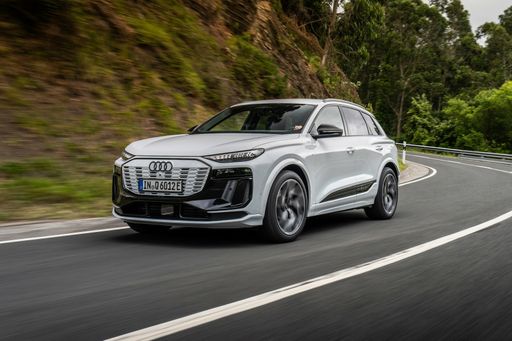
Audi Q6 e-tron
Audi Q6 e-tron
The Audi Q6 e-tron balances sleek, coupe-like styling with a roomy, upscale interior that feels modern without being showy. It delivers refined electric performance and smart tech that make daily driving effortless — the sort of EV that might make petrolheads grudgingly admit they fancy the future.
details
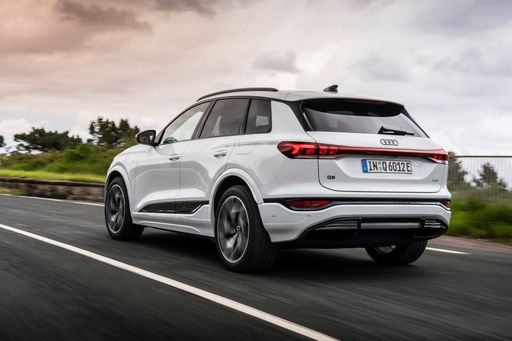
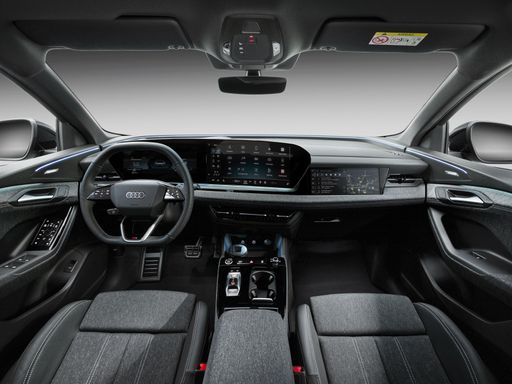
BMW X3
The BMW X3 mixes Bavarian poise with everyday practicality, delivering a composed ride and a cabin that feels both premium and lived-in. It’s the sort of SUV that lets you enjoy sporty handling without sacrificing family-friendly space, so you get fun and sense in one neat package.
details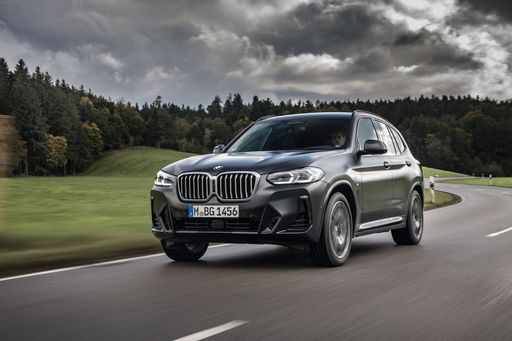
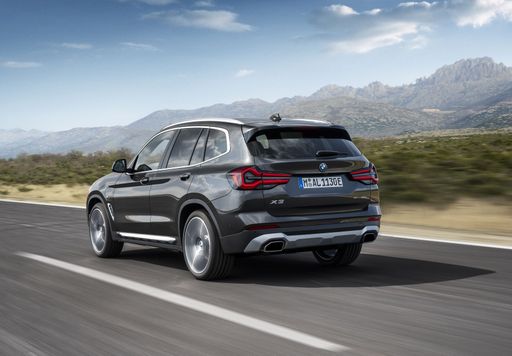
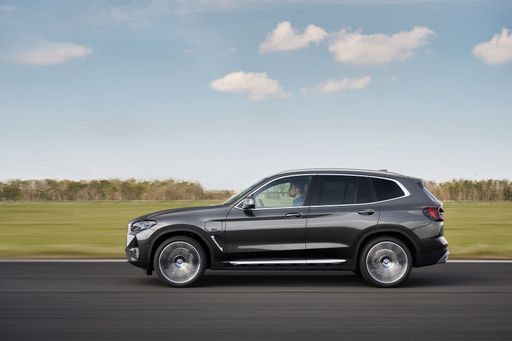
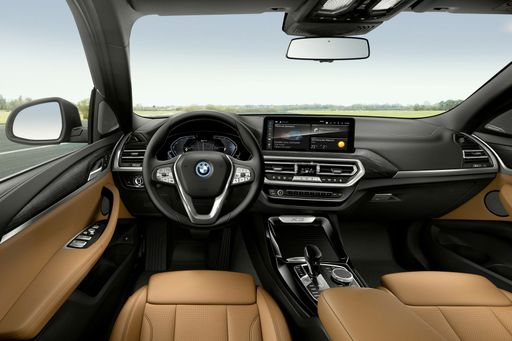
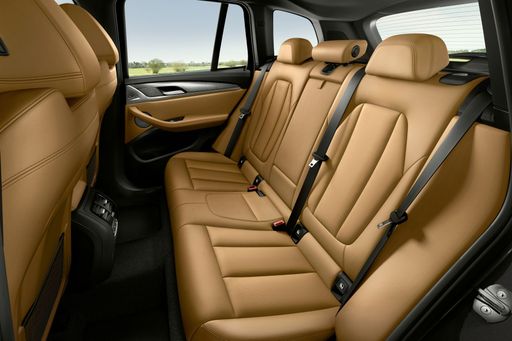
Costs and Consumption |
|
|---|---|
|
Price
54400 - 91900 £
|
Price
51300 - 72400 £
|
|
Consumption L/100km
-
|
Consumption L/100km
2.8 - 7.7 L
|
|
Consumption kWh/100km
15.6 - 18.9 kWh
|
Consumption kWh/100km
-
|
|
Electric Range
482 - 656 km
|
Electric Range
88 km
|
|
Battery Capacity
75.8 - 94.9 kWh
|
Battery Capacity
-
|
|
co2
0 g/km
|
co2
64 - 175 g/km
|
|
Fuel tank capacity
-
|
Fuel tank capacity
60 - 65 L
|
Dimensions and Body |
|
|---|---|
|
Body Type
SUV
|
Body Type
SUV
|
|
Seats
5
|
Seats
5
|
|
Doors
5
|
Doors
5
|
|
Curb weight
2200 - 2425 kg
|
Curb weight
1930 - 2140 kg
|
|
Trunk capacity
499 - 526 L
|
Trunk capacity
460 - 570 L
|
|
Length
4771 mm
|
Length
4755 mm
|
|
Width
1939 - 1965 mm
|
Width
1920 mm
|
|
Height
1665 - 1685 mm
|
Height
1660 mm
|
|
Max trunk capacity
1361 - 1529 L
|
Max trunk capacity
1700 L
|
|
Payload
540 kg
|
Payload
570 kg
|
Engine and Performance |
|
|---|---|
|
Engine Type
Electric
|
Engine Type
Petrol MHEV, Diesel MHEV, Plugin Hybrid
|
|
Transmission
Automatic
|
Transmission
Automatic
|
|
Transmission Detail
Reduction Gearbox
|
Transmission Detail
Automatic Gearbox
|
|
Drive Type
Rear-Wheel Drive, All-Wheel Drive
|
Drive Type
All-Wheel Drive
|
|
Power HP
252 - 490 HP
|
Power HP
197 - 398 HP
|
|
Acceleration 0-100km/h
4.4 - 7.6 s
|
Acceleration 0-100km/h
4.6 - 7.8 s
|
|
Max Speed
210 - 230 km/h
|
Max Speed
215 - 250 km/h
|
|
Torque
450 - 855 Nm
|
Torque
330 - 670 Nm
|
|
Number of Cylinders
-
|
Number of Cylinders
4 - 6
|
|
Power kW
185 - 360 kW
|
Power kW
145 - 293 kW
|
|
Engine capacity
-
|
Engine capacity
1995 - 2998 cm3
|
General |
|
|---|---|
|
Model Year
2024 - 2025
|
Model Year
2024 - 2025
|
|
CO2 Efficiency Class
A
|
CO2 Efficiency Class
F, E, B
|
|
Brand
Audi
|
Brand
BMW
|
What drivetrain options does the Audi Q6 e-tron have?
Available configurations include Rear-Wheel Drive or All-Wheel Drive.
